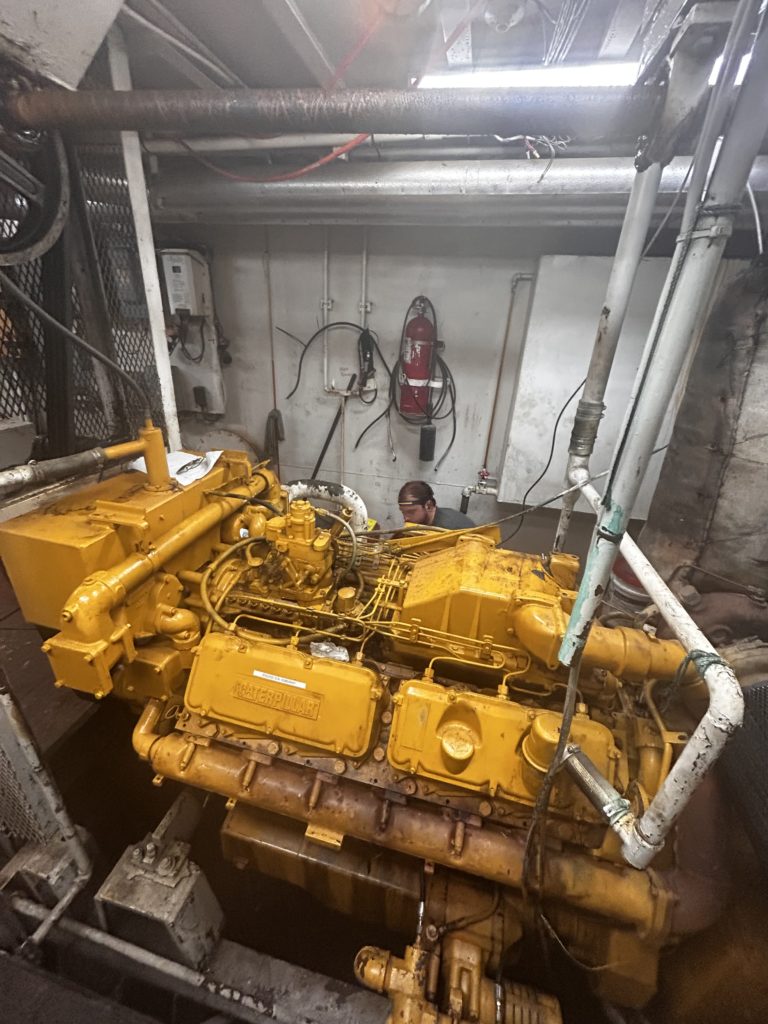Fuel efficiency is one of the most critical factors in operating marine diesel engines. It directly affects operational costs, range, and environmental impact, making it a key consideration for vessel operators. In this article, we’ll explore what fuel efficiency means for marine diesel engines, the factors influencing it, and compare how Detroit Diesel, Cummins, and Caterpillar engines perform in terms of fuel economy.
What is Fuel Efficiency in Marine Diesel Engines?
Fuel efficiency refers to the amount of energy an engine produces relative to the fuel it consumes. In marine diesel engines, it is typically measured in gallons per hour (GPH) or fuel consumption per unit of power output (e.g., grams of fuel per kilowatt-hour or g/kWh).
Key Benefits of Fuel Efficiency
- Reduced Operational Costs:
Fuel is a significant expense in marine operations. Efficient engines lower these costs.
- Extended Range:
Improved fuel efficiency allows vessels to travel longer distances without refueling.
- Environmental Impact:
Lower fuel consumption reduces greenhouse gas emissions, aligning with global efforts to minimize maritime pollution.
Factors Affecting Fuel Efficiency
- Engine Design:
- Turbocharged and aftercooled engines typically offer better fuel efficiency by improving combustion.
- Load and Operating Conditions:
- Fuel efficiency decreases under heavy loads or adverse conditions like strong currents or winds.
- Fuel efficiency decreases under heavy loads or adverse conditions like strong currents or winds.
- Maintenance:
- Regular upkeep, such as replacing filters and maintaining fuel injectors, ensures engines operate efficiently.
- Technology Integration:
- Modern engines often include electronic fuel injection and engine monitoring systems to optimize fuel consumption.
Comparing Fuel Efficiency Across Marine Diesel Engine Brands
1. Detroit Diesel: Legacy Power with Moderate Efficiency

Detroit Diesel engines are known for their durability and reliability, but their fuel efficiency often depends on the specific model and operating conditions.
- Strengths:
- Legacy models like the 71 and 92 Series are robust, with moderate fuel efficiency for their era.
- Two-stroke designs can be fuel-efficient in steady-state operations, such as continuous cruising.
- Limitations:
- Older technology in legacy models can result in higher fuel consumption compared to newer engines.
- High RPM operation may reduce fuel efficiency in certain scenarios.
Parts Catalog For Detroit Diesel
2. Cummins: Modern Efficiency with Versatility

Cummins engines are celebrated for their balance of performance and fuel efficiency. Advanced engineering and modern technologies make them a popular choice for operators focused on cost-effective operations.
- Strengths:
- Models like the 6CTA 8.3 and KTA 19 are optimized for fuel efficiency across a wide range of applications.
- Turbocharging and aftercooling improve combustion, reducing fuel consumption.
- Electronic fuel injection ensures precise fuel delivery, minimizing waste.
- Limitations:
- Fuel efficiency may vary depending on load and maintenance, requiring consistent care to achieve optimal performance.
Parts Catalog For Cummins Engines
- Fuel efficiency may vary depending on load and maintenance, requiring consistent care to achieve optimal performance.
3. Caterpillar: Heavy-Duty Performance with Competitive Efficiency

Caterpillar engines are designed for heavy-duty applications and excel in delivering reliable power. While their primary focus is on torque and durability, they also achieve competitive fuel efficiency, particularly in industrial and large-scale marine operations.
- Strengths:
- Large displacement engines like the 3412 DITA and 3500 Series are fuel-efficient when operating at optimal RPMs.
- Advanced fuel systems and efficient combustion designs reduce waste.
- Caterpillar engines are highly reliable under heavy loads, maintaining steady fuel consumption.
- Limitations:
- Larger engines may consume more fuel when used in lighter-duty applications.
- Maintenance costs can be higher, which may offset fuel savings in some cases.
Side-by-Side Comparison
Feature |
Detroit Diesel |
Cummins |
Caterpillar |
|---|---|---|---|
| Fuel Efficiency | Moderate | High | High |
| Best Use Case | Steady-state cruising | Versatile applications | Heavy-duty operations |
| Technology Integration | Moderate | Advanced | Advanced |
| Maintenance Impact | Moderate | High | High |
| Applications | Legacy vessels, towing | Recreational, commercial | Industrial, large-scale |
How to Maximize Fuel Efficiency for Marine Diesel Engines
- Select the Right Engine for the Job:
- For heavy-duty applications, Caterpillar engines offer reliable power and steady fuel consumption.
- For versatility and fuel economy, Cummins engines are an excellent choice.
- Legacy Detroit Diesel engines can be optimized with aftermarket upgrades.
- Optimize Operating Conditions:
- Run engines within their optimal RPM range to minimize fuel consumption.
- Avoid overloading the vessel, which can strain the engine and reduce efficiency.
- Maintain Regular Service:
- Replace fuel filters, clean injectors, and maintain cooling systems to ensure optimal combustion.
- Monitor engine performance with onboard diagnostic systems.
- Upgrade Technology:
- Consider retrofitting older engines with modern electronic fuel injection systems to improve fuel efficiency.
Conclusion
Fuel efficiency is a critical consideration for marine diesel engines, impacting both operational costs and environmental responsibility. Detroit Diesel, Cummins, and Caterpillar each offer unique strengths in fuel economy:
- Detroit Diesel engines provide robust performance, particularly for steady-state cruising.
- Cummins engines deliver advanced fuel efficiency and versatility across a range of marine applications.
- Caterpillar engines excel in heavy-duty operations with competitive fuel economy.
By understanding the factors that influence fuel efficiency and selecting the right engine for your vessel, you can achieve cost-effective and sustainable marine operations. For premium aftermarket parts and expert support, trust Diesel Pro Power to keep your engine running at peak efficiency.



 Free US Calls: 1-888-433-4735
Free US Calls: 1-888-433-4735 International: 305-545-5588
International: 305-545-5588